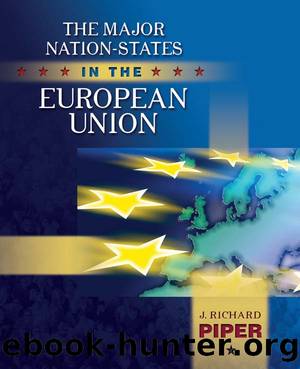Major Nation-States in the European Union by J. Richard Piper

Author:J. Richard Piper [Piper, J. Richard]
Language: eng
Format: epub
Tags: Political Science, General
ISBN: 9781317346630
Google: pEhnDwAAQBAJ
Goodreads: 28768440
Publisher: Routledge
Published: 2015-09-25T00:00:00+00:00
Chapter 10
ITALY AND THE EUROPEAN UNION
âIn spite of being a founding member and one of the big four nations in the EU, Italy has felt like a poor relative.â
âSondra Z. and Stephen P. Koff, Italy: From the First
to the Second Republic (2000), 206.
An abstract commitment to European integration has long been an attribute of Italian political leaders and, to a considerable degree, the Italian general publicâcertainly to a greater degree than in France or Britain, and probably to a greater degree than in Germany. The Italians have liked to portray themselves as responsible for the only successful historical efforts to unite most of Europe: the Roman Empire and the Roman Catholic Church. In modern times, such Italian political leaders as Luigi Einaudi, Altiero Spinelli, Carlo Sforza, Alcide De Gasperi, and Romano Prodi have repeatedly articulated the vision of European integration. Writing back in 1918, for example, Einaudi, later to serve as finance minister and then president of postâWorld War II Italy, called for a United States of Europe, to be followed by a United States of the world: âBeside the United States of America, we ought to see, in close association, the United States of Europe, while waiting to see the birth at a later moment of human progress of the United States of the world.â1 In a fashion similar to that in the West German Basic Law, the 1948 Italian Constitution provided for the pooling of sovereignty in the cause of âpeace and justice among nationsâ (Article 11).2
In accord with its embrace of an abstract vision of European integration, Italy was a founding member of the European Coal and Steel Community (ECSC) and the European Economic Community (EEC), and its leaders have almost continuously advocated an âever closer union.â However, practical calculations of how to utilize European institutions to enhance their own rather weak legitimacy at home, increase their international prestige, impose difficult decisions on an often-recalcitrant Italian society, isolate domestic Communists and their allies, and gain economic advantages have often guided Italian leadersâ decisions vis-Ã -vis Europe. Major Italian contributions to shaping European institutions and public policies have been infrequent. The Italian publicâs superficial enthusiasm for a united Europe has been accompanied by a shockingly low awareness and understanding of how the European Union operates or what it does.3 Furthermore, Italy possesses an undistinguished record as a persistent laggard in the implementation of EC/EU directives. More often than any other member state, it has been brought before the European Court of Justice (ECJ) in infringement proceedings. Italy also ranks first in the number of failures to execute European Court of Justice (ECJ) judgments.4
Paralleling the previous chapters on France and Germany and the European Union (Chapters Six and Eight, respectively), this chapter will elucidate the apparent paradox of Italyâs enthusiasm for the ideals of European integration and its general record of few initiatives and frequent noncompliance with EC/EU laws. Like the previously noted chapters, it commences with a historical overview and proceeds to analyses of the most distinctive long-term features
Download
This site does not store any files on its server. We only index and link to content provided by other sites. Please contact the content providers to delete copyright contents if any and email us, we'll remove relevant links or contents immediately.
The Pirates of Somalia by Jay Bahadur(1621)
Political Theology by Carl Schmitt(1577)
The Holocaust: A New History by Laurence Rees(1520)
The Social Animal by David Brooks(1451)
A Practical Guide to International Arbitration in London by Hilary Heilbron(1426)
Restitution by Restitution(1424)
Pirates of Somalia by Jay Bahadur(1376)
Coercing Virtue by Robert H. Bork(1356)
The Nuremberg Interviews by Leon Goldensohn(1302)
Basic International Corporate Taxation by Sebastiano Garufi(1210)
A History Of Thailand by Baker Chris(1180)
International Trade and Business: Law, Policy and Ethics by Gabriël Moens & Peter Gillies(1137)
The Global Commons by Susan J. Buck(1137)
The Sovereignty of Human Rights by Macklem Patrick(1113)
Blood Profits by Vanessa Neumann(1113)
Asian Waters by Humphrey Hawksley(1113)
Spring Fever: The Illusion of Islamic Democracy by McCarthy Andrew C(1096)
The Nuremberg Trials: The Nazis and their Crimes Against Humanity by Roland Paul(1043)
Crimes Against Humanity: Historical Evolution and Contemporary Application by M. Cherif Bassiouni(1020)
